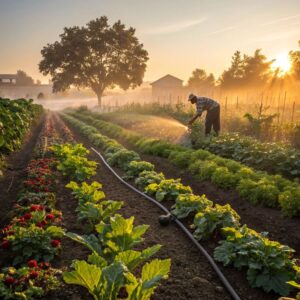;)
;)

Jun 11, 2025
Water saving tips for farmers in Sri Lanka are more important than ever. With erratic monsoons, higher energy bills, and growing pressure on natural resources, farmers must embrace smarter water management. Whether you grow paddy in Kurunegala or vegetables in Nuwara Eliya, these smart water saving tips for farmers in Sri Lanka can help you cut waste, reduce costs, and improve yields.
This guide highlights 3 proven techniques—with tools and systems available at DeepTec.lk—to build a sustainable and cost-effective farm.
“I no longer worry about water bills or droughts. These water saving tips really changed my farming.”
🔹 Solar-Powered Drip Irrigation Kit
This kit, available at DeepTec.lk, combines solar energy with precision water control. It’s perfect for off-grid farming and is easy to install.
If you’re still using traditional electric or diesel powered water pumps on your farm, it’s time to seriously reconsider. These outdated systems are not only costly to run with fuel prices and electricity bills climbing steadily but also incredibly inefficient in how they manage water. Many farmers across Sri Lanka unknowingly lose thousands of liters of water every season due to poor flow control and mechanical inefficiencies. This translates to both financial loss and unnecessary environmental strain.
That’s why one of the most practical water saving tips for farmers in Sri Lanka is to upgrade to a solar water pump Sri Lanka farmers can rely on for consistent performance and long-term savings. Solar pumps harness clean, renewable energy from the sun, which means you’ll never have to worry about diesel shortages or rising energy costs. These systems are especially beneficial in rural or off-grid areas where power outages are frequent and reliable irrigation is critical for survival.

🔹 Solar Water Pump Kit
This powerful, eco-friendly pump is perfect for medium to large farms. Visit DeepTec.lk to learn more.
Many Sri Lankan farmers still rely heavily on electric or diesel-powered pumps to irrigate their land not realizing the hidden costs and inefficiencies that come with these outdated systems. As fuel prices rise and national electricity rates fluctuate, the long-term operating costs of these pumps continue to strain farming budgets, especially for smallholders working with narrow profit margins. Even when these pumps do work reliably, they often operate with limited precision, flooding fields with more water than crops actually need. This results in significant water waste, especially during peak daylight hours when the sun is strongest and evaporation is at its highest.
What’s more, traditional pumping methods rarely support fine-tuned moisture control. Water is often applied in large amounts at once, soaking the surface but failing to penetrate deep enough into the root zone. This not only wastes water, but also leads to poor nutrient absorption, increased weed growth, and a higher risk of plant diseases due to standing water. Over time, these inefficiencies degrade soil health and lower crop productivity even if the farmer is watering regularly.
By incorporating mulching techniques and switching to moisture-smart irrigation systems such as drip irrigation systems in Sri Lanka, farmers can radically improve their efficiency. Mulching the practice of covering soil with plant residue like coconut husks, straw, or leaves helps trap moisture, reduce surface evaporation, and insulate the soil from extreme heat. When combined with a well-designed irrigation system, mulch acts as a protective barrier, ensuring that every drop of water is retained and utilized effectively. This simple, low-cost solution offers long-term benefits for both water conservation and crop health, making it one of the most accessible and effective water saving tips for farmers in Sri Lanka.

Yes. DeepTec’s solar water pump Sri Lanka kits can serve large lands with over 20,000 liters/day capacity.
Weekly inspections are ideal to prevent clogging and ensure even water flow.
For precision watering, powered entirely by the sun.
Reliable, sustainable, and cost-saving.